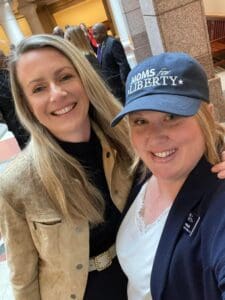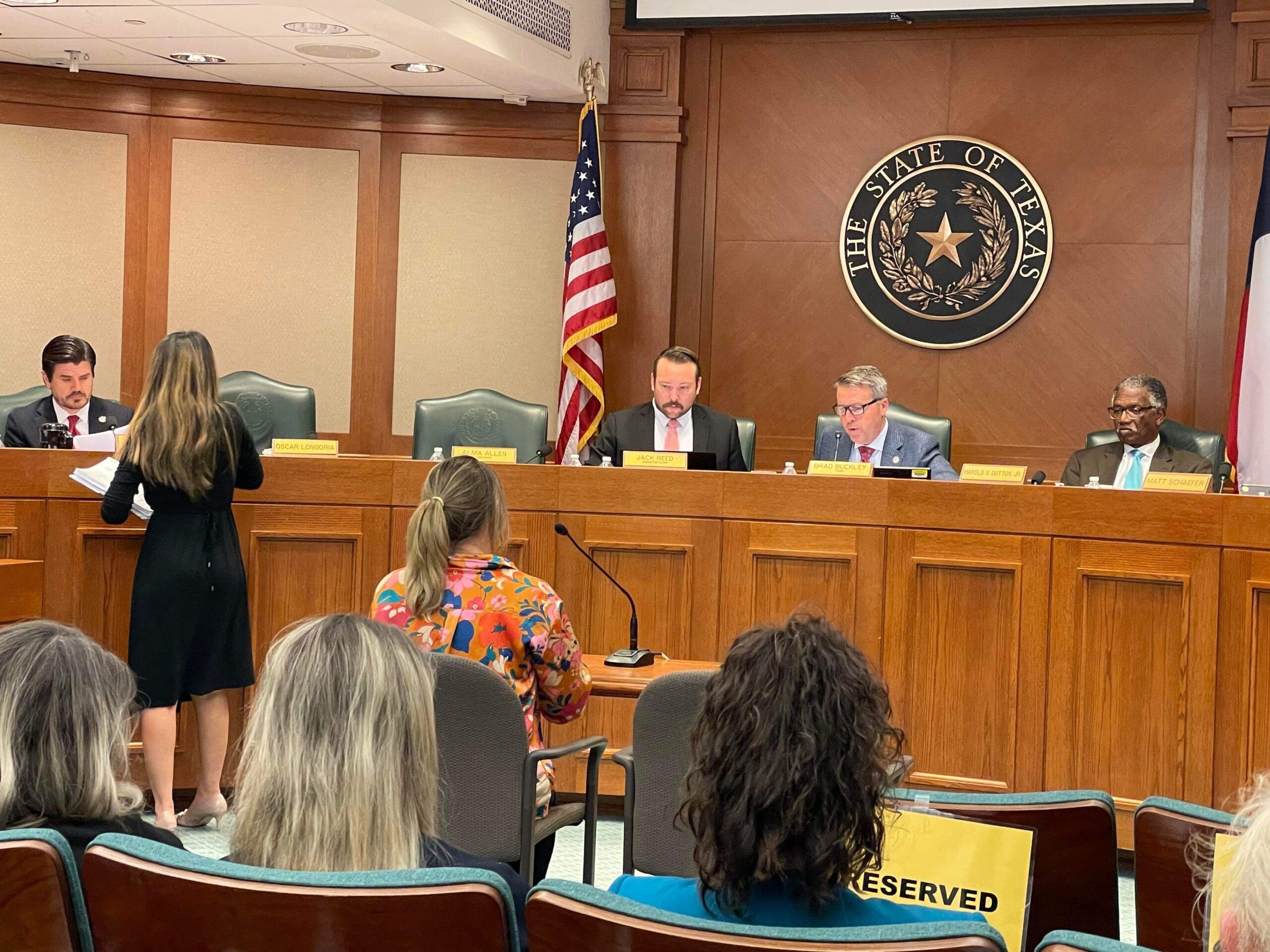Parent-backed legislation to keep sexually explicit books out of school libraries drew hours of intense, and sometimes profane, testimony during a public hearing at the Texas Capitol this week that lasted until midnight.
House Bill 900 by State Rep. Jared Patterson (R–Frisco) sets up state-level standards designed to keep inappropriate sexual content out of all Texas schools’ libraries.
Dozens of parents testified in favor of the measure, which puts the burden on vendors to rate books with sexual content.
Several librarians spoke against the bill, saying they are the “experts” who should be trusted to determine what is appropriate reading material for school children.
Keeping Explicit Content Out
Ever since COVID closures gave families a closer look inside public education, parents have been pressing local school officials to remove sexually explicit materials found in their students’ libraries. Often, they’ve been left with little to show for countless hours spent reading and reporting offensive content.
Patterson responded to parents’ frustrations.
HB 900, dubbed the READER Act (Restricting Explicit and Adult-Designated Educational Resources), keeps inappropriate material out of school libraries by holding vendors accountable for vetting the content of books “sold to or included in public school libraries.”
Books rated “sexually explicit” would not be allowed in schools; materials rated “sexually relevant” would require parental consent for students to access them.
If a vendor fails to properly rate a book and it ends up in a school library, the vendor could lose their access to sell books to Texas schools.
“Currently, the Federal Communications Commission uses similar standards to regulate inappropriate or harmful content for the protection of children, and books should be no different,” Patterson said.
He said when he approached vendors last year about vetting the books they sell to schools, Perma-Bound acknowledged they didn’t review any content but eventually agreed to pull explicit books, while Follett “chose profit over standards” and refused to stop selling explicit books to schools unless required to by law.
Patterson also said his bill will “empower parents through increased parental controls and require district transparency on sexual material through a consistent reconsideration process.”
He said his district, Frisco Independent School District, “pushed the burden onto parents to search out sexually explicit books.”
His own challenges of 28 explicit titles took three rounds of reconsiderations and appeals before administrators acknowledged 26 of the books were inappropriate and removed them from libraries.
“It took me—an elected official with a full staff and ample resources, including an army of concerned moms and teachers—four months to complete the formal process,” he said. “Imagine the strain that it would put on the average parent dealing with this issue.”
While some opponents claim Patterson’s bill targets books by and about LGBTQ people, Patterson said the target is clear: sexually explicit content that is inappropriate for young readers in a school setting.
“This is not a ‘Fahrenheit 451’ style book ban. This is not a fight about silencing minority voices. And this is not an argument about race or gender, or religion or political ideology,” he said.
If you can’t read this material on the television or over the radio, or if you can’t show these images on TV, they have no home in a school library, where students go without their parents to check out books.
Citizens Speak
“That bill does exactly what the Republican Party of Texas has asked, which is a prohibition of sexually explicit materials in our schools, and also provides transparency and a penalty,” said Christin Bentley, a Tyler ISD mom and Texas GOP representative advocating for the party’s legislative priority to Stop Sexualizing Texas Kids.
 Bentley’s “Filthy Books” campaign is supplying all 181 state lawmakers with daily reports documenting sexually explicit and inappropriate books found in Texas school libraries.
Bentley’s “Filthy Books” campaign is supplying all 181 state lawmakers with daily reports documenting sexually explicit and inappropriate books found in Texas school libraries.
“Sexually explicit materials are in Texas public schools in every single district across the state,” she said at Tuesday night’s hearing.
Committee members got an earful of the explicit content as advocates for the new book standards read excerpts to make their point.
Matt Long, a conservative activist and radio host from Fredericksburg, started with a Bible passage that committee Democrats said might meet the definition of “sexually explicit”:
That night they got their father to drink wine, and the older daughter went in and slept with him.
Long then read a graphic, profanity-laced passage about a father raping his young daughter from “The Bluest Eye,” an award-winning book that’s found in Texas school libraries.
“There’s a big difference between a graphic description and the Bible saying he slept with the daughter,” he said. “A huge, big, big difference.”
Frisco mom Shannon Ayres read a scene from “The Perks of Being a Wallflower,” describing a girl being forced to perform oral sex.
When Ayers read the same explicit passage at a Frisco ISD board meeting last year, Board President Rene Archambault scolded her because a child was in the room.
Video of the incident went viral, but the challenged book remains in Frisco school libraries.
“Perks” is one of the titles lawmakers received as part of the Filthy Books campaign. When the book was made into a movie, explicit content had to be cut for the film to receive a PG-13 rating.
Frisco ISD Associate Deputy Superintendent Wes Cunningham also spoke, telling the committee members he was “disappointed” that Patterson “felt the need to disparage Frisco ISD while laying out his bill.” He said the district has since improved its book review process.
At the time, though, Frisco ISD administrators downplayed parents’ concerns about their school libraries acquiring sexually explicit books, saying the books “slipped through the cracks” and it was “impossible” for librarians to “read every title before it was placed on library shelves.”
Yet parents are expected to jump through hoops to challenge explicit books.
Fredericksburg ISD mom Tara Petsch, who heads the Gillespie County chapter of Moms for Liberty, explained what she and other parents face.
Our book review committee is a very one-sided one, and the majority have pledged publicly to have no boundaries for minor children. My only recourse to appeal their decision to keeping sexually graphic books is to file a grievance. I have four Level 3 grievances right now. But it’s been seven months and my school district will not give me a hearing in front of the school board.
Heidi Pezdek from Lorena ISD said that as fast as she and other parents can identify sexually explicit books in their school libraries, more are “arriving in lots” from the vendors, while school officials call parents’ requests to remove the books “censorship.”
“These are the talking points of the American Library Association,” she said. “The Smut Cartel is making big money exploiting the innocence of kids.”
“This is not book banning; this is child protection,” Cindi Castilla, president of Texas Eagle Forum, summarized. “Sexually explicit materials are inappropriate for minors. They are educationally unsuitable for students. Taxpayers should not fund them.”
Librarians Speak
Several librarians spoke against HB 900, saying they are trained “experts” who should be trusted to determine what books are appropriate for school libraries.
One of them, a University of Texas student who said she’s pursuing a master’s in library science, told lawmakers “it’s simply irresponsible to allow anyone but librarians to make these decisions.”
Texas Library Association President Mary Woodard also lauded librarians as highly qualified professionals, but when questioned she told lawmakers she was “not aware” whether her association has recommended or given any awards to any sexually explicit books.
Kevin Whitt, a sexual abuse survivor from Dallas, said activist librarians are the problem.
“Radical activists have infiltrated the library association,” he said, speaking in favor of HB 900.
Whitt said sexually explicit books are traumatizing to children, especially victims of sexual abuse. He read from an explicit book found in Dallas ISD libraries called “Let’s Talk About It,” which features graphic descriptions and drawings of sexual activity.
“Someone mentioned kids need these books to inspire them to read, but I don’t see how using a butt plug is inspiring,” he said. “What I’m wondering is: Who is the one that thought it would be a great idea to add this to our library?”
Last year, activist librarians from Frisco, Leander, and Eanes ISDs won an American Library Association award for organizing school librarians around the state to promote “Freadom”—allowing kids of any age to access any reading material they want.
A former teacher representing the activist group Educators In Solidarity also promoted “freedom to read” and said the group’s members “strongly oppose HB 900” and “reject any attempt to remove or restrict access to any books in school libraries.”
A representative of the ACLU of Texas also spoke against the bill. When questioned, he refused to say if “Gender Queer”—a graphic novel featuring explicit illustrations of sex acts—was inappropriate for school libraries.
In 2020, the American Library Association gave “Gender Queer” its Alex Award, given to “books written for adults that have special appeal to young adults, ages 12 through 18.”
Patterson said despite widespread challenges, the book is still in more than 30 percent of Texas schools.
Some parents opposed HB 900 but were unable to explain to lawmakers how the measure would prevent their children from accessing any books they wanted from any sources outside schools.
“Every elected official, school district employees, librarians, and book vendors must do better to empower parents and protect children,” Patterson said.
It’s time to address this issue once and for all, and return our focus where it matters the most: ensuring our students are receiving a quality education and able to perform at or above grade level.
A revised version of the bill called a “committee substitute” was left pending, and Patterson may make more changes before the legislation advances.
Some of the parents who support Patterson’s READER Act say they want to make sure it covers books that are online, in classrooms, and donated.
Once a final version is approved by the Republican-controlled Public Education Committee, HB 900 will be sent to the House Calendars Committee, which decides what bills are considered by the full chamber and when.
House Speaker Dade Phelan designated HB 900 as priority legislation, so it’s almost certain to pass the House, then move to the Senate where the process will be repeated.
No ads. No paywalls. No government grants. No corporate masters.
Just real news for real Texans.
Support Texas Scorecard to keep it that way!






